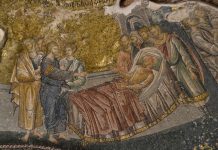Romanus III 1028—1034
Constantine was succeeded as emperor by his son-in-law Romanus, surnamed Argyropulus.**29 The latter was convinced that his reign marked the beginning of a new dynasty. The imperial family descended from Basil the Macedonian**30 had died with his predecessor and he now looked forward to a new line of monarchs descended from himself. In fact, that line was destined to perish at once, and he, after a short life, and that full of suffering, was fated to die suddenly. The story will show all this in more detail as it proceeds. From now on, the history will be more accurate than hitherto, for the emperor Basil died when I was a baby, while Constantine ended his reign just after I had begun my elementary studies.
So I was never admitted to their presence, nor did I hear them speak. Whether I even saw them I cannot say, for I was too young to remember at that time. On the other hand, I both saw Romanus and, on one occasion, actually talked with him. Naturally, therefore, my remarks on the first two emperors are based on information supplied by others, but my account of Romanus is quite independent.
This gentleman, nurtured on Greek literature, also had some acquaintance with the literary works of the Italians. He had a graceful turn of speech and a majestic utterance. A man of heroic stature, he looked every inch a king. His idea of his own range of knowledge was vastly exaggerated, but wishing to model his reign on those of the great Indianans of the past, the famous philosopher Marcus and Augustus, he paid attention particularly to two things: the study of letters and the science of war.
Of the latter he was completely ignorant, and as for letters, his knowledge was far from profound: in fact, it was merely superficial. However, this belief in his own knowledge, and this straining beyond his own intellectual limits, led him to commit mistakes on a big scale. Doubtless, if there were any sparks of wisdom lying hid beneath the ashes, he added fresh fuel to the fire, arid he enrolled a whole new tribe of philosophers and orators and all those who busied themselves in the sciences– or rather, thought they did.
That era produced few men of erudition, and even they stood only at the outer door of the Aristotelian doctrines and merely repeated the Platonic allegories, without any understanding of their hidden meaning or of the philosophers’ studies in dialectic or proof by syllogistic deduction. There being no proper criterion, their judgment on these great men was erroneous.
Read More about Tiny feet that grow outside the bodies








